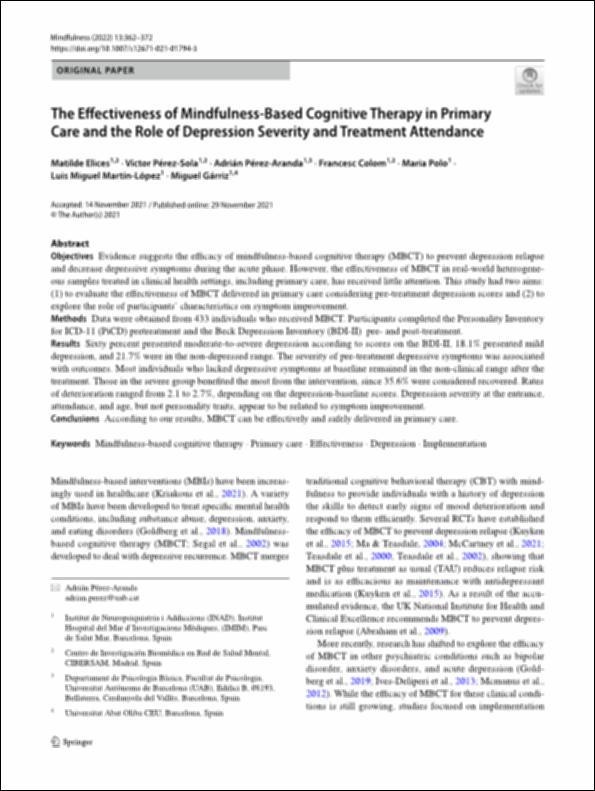Please use this identifier to cite or link to this item:
http://hdl.handle.net/10637/13879The Effectiveness of Mindfulness-Based Cognitive Therapy in Primary Care and the Role of Depression Severity and Treatment Attendance
| Title: | The Effectiveness of Mindfulness-Based Cognitive Therapy in Primary Care and the Role of Depression Severity and Treatment Attendance |
| Authors : | Elices, Matilde Pérez Solà, Víctor Pérez-Aranda, Adrián Colom, Francesc Polo, María Martín López, Luís Miguel Garriz Vera, Miguel |
| Keywords: | Terapia cognitiva.; Depresión psíquica.; Atención primaria.; Teràpia cognitiva.; Depressió psíquica.; Atenció primària. |
| Publisher: | Berlin : Springer, 2021 |
| Citation: | Elices, Matilde. Pérez‑Sola, Víctor. Pérez‑Aranda, Adrán. Colom, Francesc. Polo, María. Martín‑López, Luis Miguel. Gárriz Vera, Miguel. (2021). "The Effectiveness of Mindfulness-Based Cognitive Therapy in Primary Care and the Role of Depression Severity and Treatment Attendance". Mindfulness, Volume 13, Number 2 (2021), p. 362-372. ISSN-e 1868-8535. DOI: 10.1007/s12671-021-01794-3 |
| Abstract: | Objectives Evidence suggests the efcacy of mindfulness-based cognitive therapy (MBCT) to prevent depression relapse and decrease depressive symptoms during the acute phase. However, the efectiveness of MBCT in real-world heterogeneous samples treated in clinical health settings, including primary care, has received little attention. This study had two aims: (1) to evaluate the efectiveness of MBCT delivered in primary care considering pre-treatment depression scores and (2) to explore the role of participants’ characteristics on symptom improvement. Methods Data were obtained from 433 individuals who received MBCT. Participants completed the Personality Inventory for ICD-11 (PiCD) pretreatment and the Beck Depression Inventory (BDI-II) pre- and post-treatment. Results Sixty percent presented moderate-to-severe depression according to scores on the BDI-II, 18.1% presented mild depression, and 21.7% were in the non-depressed range. The severity of pre-treatment depressive symptoms was associated with outcomes. Most individuals who lacked depressive symptoms at baseline remained in the non-clinical range after the treatment. Those in the severe group benefted the most from the intervention, since 35.6% were considered recovered. Rates of deterioration ranged from 2.1 to 2.7%, depending on the depression-baseline scores. Depression severity at the entrance, attendance, and age, but not personality traits, appear to be related to symptom improvement. Conclusions According to our results, MBCT can be efectively and safely delivered in primary care. |
| Description: | En: Mindfulness, Volume 13, Number 2 (2021), p. 362-372. ISSN-e 1868-8535. DOI : 10.1007 / s12671-021-01794-3 1 recurs en línia (p. 362-372) |
| URI: | http://hdl.handle.net/10637/13879 |
| ISSN: | 1868-8535 (Electrónico) |
| Issue Date: | 19-Sep-2022 |
| Center : | Universitat Abat Oliba CEU |
| Appears in Collections: | Documents de recerca |
Items in DSpace are protected by copyright, with all rights reserved, unless otherwise indicated.


